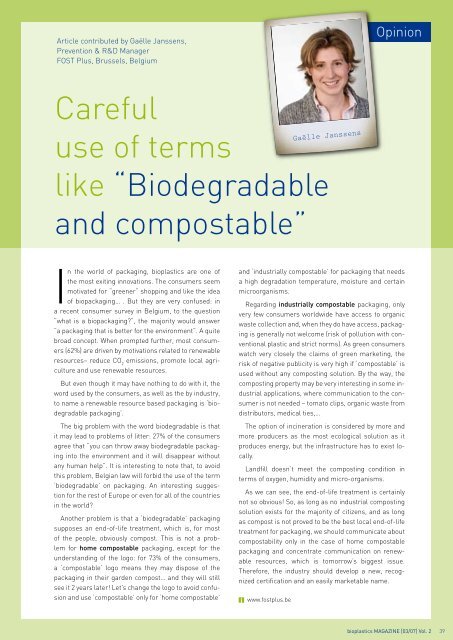bioplasticsMAGAZINE_0703
bioplasticsMAGAZINE_0703
bioplasticsMAGAZINE_0703
Create successful ePaper yourself
Turn your PDF publications into a flip-book with our unique Google optimized e-Paper software.
Article contributed by Gaëlle Janssens,<br />
Prevention & R&D Manager<br />
FOST Plus, Brussels, Belgium<br />
Opinion<br />
Careful<br />
use of terms<br />
Gaëlle Janssens<br />
like “Biodegradable<br />
and compostable”<br />
In the world of packaging, bioplastics are one of<br />
the most exiting innovations. The consumers seem<br />
motivated for “greener“ shopping and like the idea<br />
of biopackaging… . But they are very confused: in<br />
a recent consumer survey in Belgium, to the question<br />
“what is a biopackaging?”, the majority would answer<br />
“a packaging that is better for the environment”. A quite<br />
broad concept. When prompted further, most consumers<br />
(62%) are driven by motivations related to renewable<br />
resources– reduce CO 2<br />
emissions, promote local agriculture<br />
and use renewable resources.<br />
But even though it may have nothing to do with it, the<br />
word used by the consumers, as well as the by industry,<br />
to name a renewable resource based packaging is ‘biodegradable<br />
packaging’.<br />
The big problem with the word biodegradable is that<br />
it may lead to problems of litter: 27% of the consumers<br />
agree that “you can throw away biodegradable packaging<br />
into the environment and it will disappear without<br />
any human help”. It is interesting to note that, to avoid<br />
this problem, Belgian law will forbid the use of the term<br />
‘biodegradable’ on packaging. An interesting suggestion<br />
for the rest of Europe or even for all of the countries<br />
in the world?<br />
Another problem is that a ‘biodegradable’ packaging<br />
supposes an end-of-life treatment, which is, for most<br />
of the people, obviously compost. This is not a problem<br />
for home compostable packaging, except for the<br />
understanding of the logo: for 73% of the consumers,<br />
a ‘compostable’ logo means they may dispose of the<br />
packaging in their garden compost… and they will still<br />
see it 2 years later! Let’s change the logo to avoid confusion<br />
and use ‘compostable’ only for ‘home compostable’<br />
and ‘industrially compostable’ for packaging that needs<br />
a high degradation temperature, moisture and certain<br />
microorganisms.<br />
Regarding industrially compostable packaging, only<br />
very few consumers worldwide have access to organic<br />
waste collection and, when they do have access, packaging<br />
is generally not welcome (risk of pollution with conventional<br />
plastic and strict norms). As green consumers<br />
watch very closely the claims of green marketing, the<br />
risk of negative publicity is very high if ‘compostable’ is<br />
used without any composting solution. By the way, the<br />
composting property may be very interesting in some industrial<br />
applications, where communication to the consumer<br />
is not needed – tomato clips, organic waste from<br />
distributors, medical ties,…<br />
The option of incineration is considered by more and<br />
more producers as the most ecological solution as it<br />
produces energy, but the infrastructure has to exist locally.<br />
Landfill doesn’t meet the composting condition in<br />
terms of oxygen, humidity and micro-organisms.<br />
As we can see, the end-of-life treatment is certainly<br />
not so obvious! So, as long as no industrial composting<br />
solution exists for the majority of citizens, and as long<br />
as compost is not proved to be the best local end-of-life<br />
treatment for packaging, we should communicate about<br />
compostability only in the case of home compostable<br />
packaging and concentrate communication on renewable<br />
resources, which is tomorrow’s biggest issue.<br />
Therefore, the industry should develop a new, recognized<br />
certification and an easily marketable name.<br />
www.fostplus.be<br />
bioplastics MAGAZINE [03/07] Vol. 2 39


















